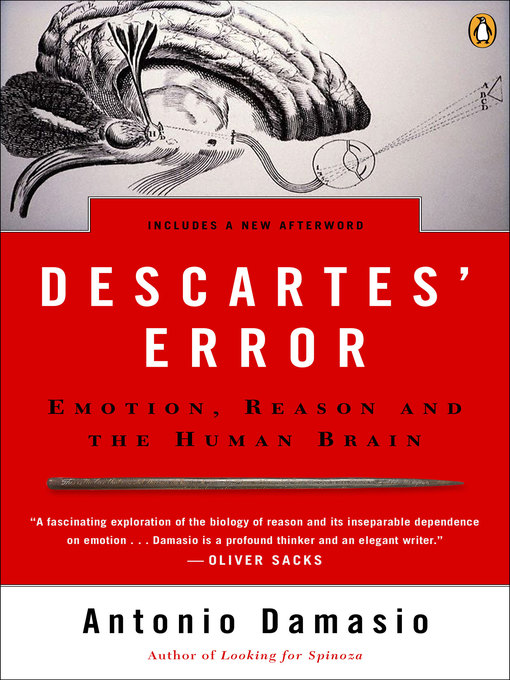Ошибка Декарта (ЛП)
Перевод фанфика-предыстории романтических отношений связиста и первого…
СКАЧАТЬ НАПРЯМУЮ С МОБИЛЬНОГО УСТРОЙСТВА. ОТСКАНИРУЙТЕ QR ЛИНК ВНИЗУ
СКАЧАТЬ БЕСПЛАТНО КНИГУ «Ошибка Декарта (ЛП)»
-
Description
-
Details
-
Reviews
Since Descartes famously proclaimed, «I think, therefore I am,» science has often overlooked emotions as the source of a person’s true being. Even modern neuroscience has tended, until recently, to concentrate on the cognitive aspects of brain function, disregarding emotions. This attitude began to change with the publication of Descartes’ Error in 1995. Antonio Damasio—»one of the world’s leading neurologists» (The New York Times)—challenged traditional ideas about the connection between emotions and rationality. In this wondrously engaging book, Damasio takes the reader on a journey of scientific discovery through a series of case studies, demonstrating what many of us have long suspected: emotions are not a luxury, they are essential to rational thinking and to normal social behavior.

Publisher:
Penguin Publishing Group
Kindle Book
- Release date: September 27, 2005
OverDrive Read
- ISBN: 9781101640135
- Release date: September 27, 2005
EPUB ebook
- ISBN: 9781101640135
- File size: 1014 KB
- Release date: September 27, 2005
Loading
Since Descartes famously proclaimed, «I think, therefore I am,» science has often overlooked emotions as the source of a person’s true being. Even modern neuroscience has tended, until recently, to concentrate on the cognitive aspects of brain function, disregarding emotions. This attitude began to change with the publication of Descartes’ Error in 1995. Antonio Damasio—»one of the world’s leading neurologists» (The New York Times)—challenged traditional ideas about the connection between emotions and rationality. In this wondrously engaging book, Damasio takes the reader on a journey of scientific discovery through a series of case studies, demonstrating what many of us have long suspected: emotions are not a luxury, they are essential to rational thinking and to normal social behavior.

-
Details
Publisher:
Penguin Publishing Group
Kindle Book
Release date: September 27, 2005
OverDrive Read
ISBN: 9781101640135
Release date: September 27, 2005
EPUB ebook
ISBN: 9781101640135
File size: 1014 KB
Release date: September 27, 2005
-
Creators
-
Formats
Kindle Book
OverDrive Read
EPUB ebook
-
Languages
-
Reviews
Loading
-
Description
-
Details
-
Reviews
Since Descartes famously proclaimed, «I think, therefore I am,» science has often overlooked emotions as the source of a person’s true being. Even modern neuroscience has tended, until recently, to concentrate on the cognitive aspects of brain function, disregarding emotions. This attitude began to change with the publication of Descartes’ Error in 1995. Antonio Damasio—»one of the world’s leading neurologists» (The New York Times)—challenged traditional ideas about the connection between emotions and rationality. In this wondrously engaging book, Damasio takes the reader on a journey of scientific discovery through a series of case studies, demonstrating what many of us have long suspected: emotions are not a luxury, they are essential to rational thinking and to normal social behavior.

Publisher:
Penguin Publishing Group
Kindle Book
- Release date: September 27, 2005
OverDrive Read
- ISBN: 9781101640135
- Release date: September 27, 2005
EPUB ebook
- ISBN: 9781101640135
- File size: 1014 KB
- Release date: September 27, 2005
Loading
Since Descartes famously proclaimed, «I think, therefore I am,» science has often overlooked emotions as the source of a person’s true being. Even modern neuroscience has tended, until recently, to concentrate on the cognitive aspects of brain function, disregarding emotions. This attitude began to change with the publication of Descartes’ Error in 1995. Antonio Damasio—»one of the world’s leading neurologists» (The New York Times)—challenged traditional ideas about the connection between emotions and rationality. In this wondrously engaging book, Damasio takes the reader on a journey of scientific discovery through a series of case studies, demonstrating what many of us have long suspected: emotions are not a luxury, they are essential to rational thinking and to normal social behavior.

-
Details
Publisher:
Penguin Publishing Group
Kindle Book
Release date: September 27, 2005
OverDrive Read
ISBN: 9781101640135
Release date: September 27, 2005
EPUB ebook
ISBN: 9781101640135
File size: 1014 KB
Release date: September 27, 2005
-
Creators
-
Formats
Kindle Book
OverDrive Read
EPUB ebook
-
Languages
-
Reviews
Loading
896
Previews
36
Favorites
Purchase options
Better World Books
DOWNLOAD OPTIONS
No suitable files to display here.
14 day loan required to access EPUB and PDF files.
IN COLLECTIONS
Books to Borrow
Books for People with Print Disabilities
Internet Archive Books
Scanned in China
Uploaded by
Tracey.Gutierres
on October 18, 2010
From Wikipedia, the free encyclopedia

The original paperback edition |
|
| Author | António Damásio |
|---|---|
| Language | English |
| Published | 1994 |
| Pages | 312 |
| ISBN | 978-0-399-13894-2 |
Descartes’ Error: Emotion, Reason, and the Human Brain is a 1994 book by neuroscientist António Damásio describing the physiology of rational thought and decision, and how the faculties could have evolved through Darwinian natural selection.[1] Damásio refers to René Descartes’ separation of the mind from the body (the mind/body dualism) as an error because reasoning requires the guidance of emotions and feelings conveyed from the body.[2][3] Written for the layperson, Damásio uses the dramatic 1868 railroad accident case of Phineas Gage as a reference for incorporating data from multiple modern clinical cases, enumerating damaging cognitive effects when feelings and reasoning become anatomically decoupled.[3] The book provides an analysis of diverse clinical data contrasting a wide range of emotional changes following frontal lobe damage[4] as well as lower (medulla) and anterior areas of the brain such as the anterior cingulate. Among his experimental evidence and testable hypotheses, Damásio presents the «somatic marker hypothesis», a proposed mechanism by which emotions guide (or bias) behavior and decision-making, and positing that rationality requires emotional input. He argues that René Descartes’ «error» was the dualist separation of mind and body, rationality and emotion.
Publication data[edit]
- Damásio, António (1994). Descartes’ Error: Emotion, Reason, and the Human Brain. Putnam. ISBN 0-399-13894-3.
- Harper Perennial, 1995 paperback: ISBN 0-380-72647-5
- Penguin, 2005 paperback reprint: ISBN 0-14-303622-X
See also[edit]
- Gerald Edelman
- Oliver Sacks
- Triune brain
References[edit]
- ^ Marg 1995.
- ^ Hyyppä 1996.
- ^ a b Hughes & Harding 2014.
- ^ Panksepp 1998, p. 388.
Bibliography[edit]
- Hughes, Tom; Harding, Katharine (2014). «Review: Descartes’ error». Practical Neurology. 14 (3): 201. doi:10.1136/practneurol-2014-000899. S2CID 219202774.
- Hyyppä, Markku (October 1996). «Review: Descartes’ error». Journal of Psychosomatic Research. 41 (4): 386. doi:10.1016/S0022-3999(96)00093-1.
- Panksepp, Jaak (1998). Affective Neuroscience: The Foundations of Human and Animal Emotions. New York, NY: Oxford University Press. ISBN 978-0-19-517805-0.
- Marg, Elwin (1995). «Review: Descartes’ error». Optometry and Vision Science. 72 (11). doi:10.1097/00006324-199511000-00013. Retrieved 2021-09-08.
Further reading[edit]
J. Birtchnell, The Two of Me: The Rational Outer Me and The Emotional Inner Me (London 2003)
J. Panksepp, Affective Neuroscience (OUP 1998)
Укажите регион, чтобы мы точнее рассчитали условия доставки
Начните вводить название города, страны, индекс, а мы подскажем
Например:
Москва,
Санкт-Петербург,
Новосибирск,
Екатеринбург,
Нижний Новгород,
Краснодар,
Челябинск,
Кемерово,
Тюмень,
Красноярск,
Казань,
Пермь,
Ростов-на-Дону,
Самара,
Омск






